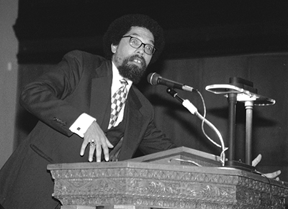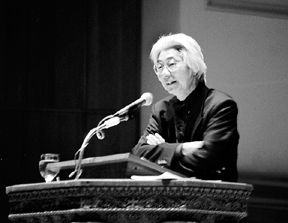









This year President Nancy Dye revived the tradition of the campus convocation by inviting Cornel West, professor of African-American studies and the philosophy of religion at Harvard University, and Ronald Takaki, professor of ethnic studies at the University of California at Berkeley, to speak in Finney Chapel.
The convocation was once an Oberlin tradition, allowing the campus to gather in a central location to hear lectures, music and share opinions.
West's speech, delivered early in September, kicked off first semester and packed Finney's pews. Though it was not as well attended as West's talk, Takaki's delivery filled two-thirds of Finney at the beginning of second semester.
Takaki and West both addressed issues of multiculturalism. Though West's talk was entitled 'Learning and Labor: Building Community Through Service', he expounded upon affirmative action, race relations and ethnic studies while incorporating Tolstoy, KRS-One and his grandmother.
Takaki's lecture, 'The Crucible of the Culture Wars,' reviewed the history of the struggle for multicultural requirements and ethnic studies at Berkeley, as well as the need for ethnic studies in a well-rounded education.
Both lectures were followed by a question and answer session.
Student reaction to both convocations was mixed. While students appreciated that the President's Office made the effort to bring an Asian-American speaker to campus, they also spoke of the need to see the administration also take concrete steps toward making a commitment to establishing Asian-American studies.
"Speakers alone don't show anything," said sophomore Maria Kong, co-chair of the Asian-American Alliance, in February.
Dye said she thought Takaki had some "very good things to say in the academy and in curricular development."
Dye said she thought both convocations were a success, and hopes to continue to hold them in the future. She said the Finney Lecture Committee will look for speakers who will appeal to a lot of groups on campus, and work with other groups to choose such speakers.

West, the author of 11 books including Keeping the Faith and Race Matters, spoke about the tradition of struggle, institutional racism, race problems, white supremacy and market mentality and values.
Throughout the lecture, West spoke emphatically about such topics. He spoke in an unwavering expressive voice that made even the words "God bless you" after a sneeze seem powerful.
"Race is a construct. It has had deep consequences," West told the crowd. His comments about the degradation of black people's bodies created by society's definition of beauty met with applause from the audience.
West identified himself as "a democrat with a small 'd' and a Christian with a big 'C'." But he added that he constantly struggles with who he is. West said that there is a need for people to instill non-market values in their lives, including love, caring and concern. Although he said he is neither a pessimist or an optimist, West concluded his speech by saying that he is a "prisoner of hope."
Takaki dedicated a good deal of his speech to the struggle of students and faculty at Berkeley to bring a more multicultural focus to the curriculum. He said that in the 70s, as the make-up of the university population shifted dramatically to minority groups, Berkeley had no choice but to shift as well. He said students told the faculty through protests and action to "Look at our faces. We are not represented in your classes."
As a result, the faculty and administration of Berkeley were forced to ask themselves what an "educated Californian" should know for the 21st century. They debated the question for two years, amid numerous student protests and demonstrations, finally instituting a multicultural requirement in 1989.
Takaki said student involvement was crucial in the university's decision to create an ethnic studies department and multicultural requirement.
He also described Oberlin's cultural diversity requirement as "too broad
When Takaki spoke of the need for a diverse curriculum, students in the crowd applauded, making him pause and survey the audience.
Ten-toes-Takaki Ronald Takaki spoke of organizing an Ethnic Studies program at UC, as well as his fame and nickname as a surfer. (photo by John Matney)
Western moves West's speech captivated a packed Finney at the start of the school year. (photo by Mike Oleson)

Copyright © 1997, The Oberlin Review.
Volume 125, Number 25, May 23, 1997
Contact Review webmaster with suggestions or comments at ocreview@www.oberlin.edu.
Contact Review editorial staff at oreview@oberlin.edu.